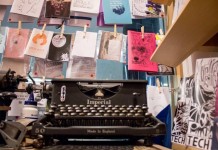
From Martin Taylor’s eReport:
A company which believes it is Australia’s first digital-only trade publisher launched last week with a roster of titles from five Australian authors.
Really Blue Books publisher Sarah Bailey sees an opening in the market for a publisher with a digital-only focus prepared to promote new, creative talent. ”We are particularly keen to benefit and nurture our home-grown writers by providing them with an attractive alternative to self-publishing in the digital publishing realm,” she says.
The five titles available at launch are all fiction, including three young adult titles, but the company also plans to publish non-fiction. Bailey expects to publish between 20 and 40 titles in RBB’s first year.
eREPORT caught up with Bailey to find out why she and her business partner started Really Blue Books and what they plan to do differently from traditional publishers.
eREPORT: Tell us a little about Really Blue Books and why you’ve started it.
Sarah Bailey, Really Blue Books
SB: Really Blue Books is essentially your rogue epublisher and ebookshop of the modern digital publishing industry. Our aim is to be an island of quality and consumer trust in the sea of poor quality digital works created by widespread self-publishing and fluctuating pricing strategies.
While major publishers may only wish to consider their bottom lines and minimise risk in only publishing known authors, we wish to gain from a wider source and distribute back to the community. We are focused towards nurturing debut and current authors wishing to launch into digital as part of their professional writing careers. We are passionate about getting new talent out into the marketplace and we think that the readers will appreciate having a new, modern alternative with reasonable prices, providing accessible content in multiple formats.
eREPORT: What’s your background? Publishing? Technology?
SB: Both, luckily. Really Blue Books is run by myself and my brother, Sam Bailey. I am from an editorial/publishing background with a digital focus, and Sam is an expert in IT systems development and programming – the perfect collaboration of skills for creating ebooks and web-based platforms in the current market.
eREPORT: How do you get started as an indie digital publisher? Name brand authors with backlist rights reverted? Fresh new talent? Any signs that big authors are open to risk-taking to help start-ups? (They should be)
SB: I completed a Masters degree based around digital publishing and saw an opportunity unfolding in the market for digital start-ups. As we had the skills required to set up, and healthy egos, we decided to shake up the traditionalists and offer both authors and readers a new, modern option built specifically to cater to the ebook market sector.
It is one thing for existing publishers to adapt, re-skill and build new systems, and quite another to be purpose-built for the future market. So far, all our predictions and observations of the market have been realised, filling us with confidence as to the direction and method we’ve chosen. I’ve heard that RBB is to be cast as the Oracle in the next Matrix movie. Really.
As for our author base, I suspect many big authors are locked into long-winded, long-term contracts with their current publishers or see the safety in remaining with the known. While some previously published authors have found their way to our modest abode, they are ones who either have a particular interest in digital – the new market and its innovative possibilities, have found their current agents and publishers resistant to digital-based works, or have been bribed with delicious chocolate and excellent royalty rates (mostly chocolate though). Many submissions are coming from new talent and we’ve been pleasantly surprised at the volume and quality of the works bombarding our inboxes. It’s absolutely brilliant and very flattering!
eREPORT: What are your three or four key promotional strategies to cut through? How do you use digital marketing?
SB: Really Blue Books has to interact with customers through digital mediums to effectively communicate with those most interested in ebooks. Therefore social media, search engine optimisation and third-party customer bases are important to us. Reviews are still an important part of gaining reception, but word of mouth and viral advertising are even more effective when it comes to audience reach. We also have a few (top secret) strategies to distinguish RBB as a digital publisher with a difference, increasing interactivity, feedback, communication forms and accessibility. We are so entrenched and committed to digital that our office itself is virtual and yet all components – author, publisher, IT, customer etc. – can interact effectively. We ARE the Internet. Our long-range view of digital publishing is very, well, long.
eREPORT: What innovations will an indie publisher like yours introduce to the author/publisher relationship?
SB: We are currently building a web management system through which authors and their editors and publisher can interact, all working on the same manuscript. Authors will be able to check their manuscript’s status right from submission through production to completion and listing for sale.
Another of our ‘soon to come’ features is an RBB author-specific forum through which our authors can support each other in this digital sea of madness, working together to create ideas, give feedback, and summon lynch mobs into being to hold their errant publisher accountable should we stuff up.
Of course, our royalty rate is second to none and we believe in working WITH the author on their labour of love/ball and chain (choose appropriate) to create the best work possible for both sides of the partnership, rather than taking the faceless corporate mentality of content acquisition.
We even try to provide feedback and suggestions for as many submissions as possible. If authors have given us the privilege of reading their version of War and Peace, then it is our responsibility to afford each work the respect it deserves. Writing an entire novel is no easy task!
Also, as no doubt others are adapting to now, we acquire world rights to our titles. The Internet makes all distribution equal and we will see a huge reduction in the division of rights into territories.
eREPORT: Who else is doing what you’re doing in Australia and are there signs of a community developing?
SB: Surprisingly no one! Existing Australian publishers are converting their backlist and releasing new titles in print and digital simultaneously, and some, such as Pan Macmillan, have gone as far to launch new digital-only imprints. However, after a thorough search (and we’re happy to be proven wrong as we’d love to be part of a supportive digital community), Really Blue Books seems to be the only digital-only trade publisher in Australia. This is perhaps why we feel the need to develop our own community with our authors to bolster independent digital publishing and assist those new to digital with the transition and differences in reaching their audience.
eREPORT: How important is the DRM issue to the commercial success of what you’re doing (given that the vast majority of ebook sales go through ebooksellers with DRM applied)? If an author wants DRM, will you allow them to?
SB: DRM is a key issue for us. Huge. It cannot be disputed that as soon as a new version of DRM is created, it is cracked and the information widely available to any with access to a search engine. It seems pointless to us and unreasonably limiting for the consumer. We do not presume to tell the reader how to read their book. We are not a lending library as Amazon wishes to be.
There is no evidence that those who download pirated works would have otherwise purchased them, so it seems ridiculous to annoy customers by ineffectively preventing them from doing what we already know they will. You only have to look at the parallels between the book industry’s digital revolution and that of the music industry when Apple appeared with iTunes to see that DRM is unlikely to be a long-term solution to piracy, and we are anticipating that eventuality. Piracy has been an issue from the birth of books and is unlikely to be stopped now by a few lines of code, hence we do not see any commercial liability in pursuing this path.
If an author was particularly keen on having DRM applied to their work, then there are plenty of other publishers out there who will happily comply (and will see no other option). In fact, at the Digital Book World Conference recently, publishers have been advised to drop DRM for their titles, as we have anticipated. This stance is an integral part of our company philosophy and is non-negotiable in our contracts. It is the author’s challenge, should they choose to accept it.
eREPORT: Tell us about your list and the titles you’ll have available at launch.
SB: We plan to publish somewhere between 20 and 40 titles in our first year. It may sound excessive (and vague) but the size and type of publication can vary, as can the amount of editing, design and production required to get Cinderella to the Ball.
We have five titles for launch:
- THEM by Adrian Deans (author of Mr Cleansheets) – adult speculative fiction in an Australian setting
- Kiss Kill by Jeni Mawter (author of the ‘SO’ series published by HarperCollins) – a unique transmedia teenage fiction novel
- Milo and I by Antony Mann – digital release of his UK and Japan published adult crime fiction short stories with a comedic twist
- Repetition by Elissa de Heer – debut teenage fiction novel
- Pendulum by Nick Duhigg – debut teenage fiction novel
Our ebooks are available from our website and web management system which will be our main, and cheapest, distribution platform from a consumer viewpoint.
































Since they have chosen to drop DRM, which is commendable, one assumes that the e-pub format they provide would be convertible to mobi for Australian consumers who own Kindles. Or am I reading this wrong?
Hi Mary, that is correct. The EPUB files are convertible to mobi for use on Kindles. A good way to do so is with the free program Calibre. Our ebooks will soon also be listed for sale on Amazon for those unsure about the conversion process.
@Mary That’s correct. You can choose to convert to whichever formats you wish using programs such as calibre. We are providing pub and pdf formats at launch. However, if you don’t mind paying an ever so slightly higher price, our titles will also be available on Amazon shortly.
You can’t half tell Sam and I are related! We even think the same (scary…).